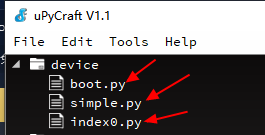对于ESP8266的开发,在arduino平台上的开发库非常多,arduino上也可以找到esp8266 OTA的许多解决方案,最近突然对Mircopython好奇起来,想通过Mircopython写一下esp8266运行的程序,然后过程中查找了许多的资料都没有看到Mircopython平台上如何OTA升级esp8266固件,于是自己胡乱做了一个用起来还不错的替代方案,给爱好者们提供一个小小的参考思路,直接进入正题。
我是使用uPyCraft烧录以及编辑代码的,下载uPyCraft链接: https://pan.baidu.com/s/1HARl7J3fy0J11I_FHG8fCg 提取码: 5u4k
第一次插入开发版会自动提示烧录Mircopython固件,选择好设置点击OK,或者通过菜单Tools→BurnFirmware进行烧录。

用uPyCraft工具烧完成后,device文件夹为esp8266寄存器中的根目录,device目录下仅有一个boot.py文件,次文件为esp8266每次启动时必定执行一次的文件,随后上传simple.py以及index0.py文件,simple.py文件为MQTT连接库,可以在从目录uPy_lib/umqtt中直接找到拖拽到device目录。以下代码我也会全部给出。
boot.py:
# This file is executed on every boot (including wake-boot from deepsleep)
#import esp
#esp.osdebug(None)
import gc
import os
#import webrepl
#webrepl.start()
gc.collect()
base = '0'
try:
file = open('base.ini','r')
base = file.read()
file.close()
except:
file = open('base.ini','w')
file.write('0')
file.close()
if base == '1':
print("加载用户1。。。。")
try:
os.remove('index0.py')
print("删除用户0完成")
except:
print("删除用户0失败")
import index1
index1.connectWiFi()
else :
print("加载用户0。。。。")
try:
os.remove('index1.py')
print("删除用户1完成")
except:
print("删除用户1失败")
import index0
index0.connectWiFi()simple.py:
import usocket as socket
import ustruct as struct
#from ubinascii import hexlify
class MQTTException(Exception):
pass
class MQTTClient:
def __init__(self, client_id, server, port=0, user=None, password=None, keepalive=0,ssl=False, ssl_params={}):
if port == 0:
port = 8883 if ssl else 1883
self.client_id = client_id
self.sock = None
self.addr = socket.getaddrinfo(server, port)[0][-1]
self.ssl = ssl
self.ssl_params = ssl_params
self.pid = 0
self.cb = None
self.user = user
self.pswd = password
self.keepalive = keepalive
self.lw_topic = None
self.lw_msg = None
self.lw_qos = 0
self.lw_retain = False
def _send_str(self, s):
self.sock.write(struct.pack("!H", len(s)))
self.sock.write(s)
def _recv_len(self):
n = 0
sh = 0
while 1:
b = self.sock.read(1)[0]
n |= (b & 0x7f) << sh
if not b & 0x80:
return n
sh += 7
def set_callback(self, f):
self.cb = f
def set_last_will(self, topic, msg, retain=False, qos=0):
assert 0 <= qos <= 2
assert topic
self.lw_topic = topic
self.lw_msg = msg
self.lw_qos = qos
self.lw_retain = retain
def connect(self, clean_session=True):
self.sock = socket.socket()
self.sock.connect(self.addr)
if self.ssl:
import ussl
self.sock = ussl.wrap_socket(self.sock, **self.ssl_params)
msg = bytearray(b"\x10\0\0\x04MQTT\x04\x02\0\0")
msg[1] = 10 + 2 + len(self.client_id)
msg[9] = clean_session << 1
if self.user is not None:
msg[1] += 2 + len(self.user) + 2 + len(self.pswd)
msg[9] |= 0xC0
if self.keepalive:
assert self.keepalive < 65536
msg[10] |= self.keepalive >> 8
msg[11] |= self.keepalive & 0x00FF
if self.lw_topic:
msg[1] += 2 + len(self.lw_topic) + 2 + len(self.lw_msg)
msg[9] |= 0x4 | (self.lw_qos & 0x1) << 3 | (self.lw_qos & 0x2) << 3
msg[9] |= self.lw_retain << 5
self.sock.write(msg)
#print(hex(len(msg)), hexlify(msg, ":"))
self._send_str(self.client_id)
if self.lw_topic:
self._send_str(self.lw_topic)
self._send_str(self.lw_msg)
if self.user is not None:
self._send_str(self.user)
self._send_str(self.pswd)
resp = self.sock.read(4)
assert resp[0] == 0x20 and resp[1] == 0x02
if resp[3] != 0:
raise MQTTException(resp[3])
return resp[2] & 1
def disconnect(self):
self.sock.write(b"\xe0\0")
self.sock.close()
def ping(self):
self.sock.write(b"\xc0\0")
def publish(self, topic, msg, retain=False, qos=0):
pkt = bytearray(b"\x30\0\0\0")
pkt[0] |= qos << 1 | retain
sz = 2 + len(topic) + len(msg)
if qos > 0:
sz += 2
assert sz < 2097152
i = 1
while sz > 0x7f:
pkt[i] = (sz & 0x7f) | 0x80
sz >>= 7
i += 1
pkt[i] = sz
#print(hex(len(pkt)), hexlify(pkt, ":"))
self.sock.write(pkt, i + 1)
self._send_str(topic)
if qos > 0:
self.pid += 1
pid = self.pid
struct.pack_into("!H", pkt, 0, pid)
self.sock.write(pkt, 2)
self.sock.write(msg)
if qos == 1:
while 1:
op = self.wait_msg()
if op == 0x40:
sz = self.sock.read(1)
assert sz == b"\x02"
rcv_pid = self.sock.read(2)
rcv_pid = rcv_pid[0] << 8 | rcv_pid[1]
if pid == rcv_pid:
return
elif qos == 2:
assert 0
def subscribe(self, topic, qos=0):
assert self.cb is not None, "Subscribe callback is not set"
pkt = bytearray(b"\x82\0\0\0")
self.pid += 1
struct.pack_into("!BH", pkt, 1, 2 + 2 + len(topic) + 1, self.pid)
#print(hex(len(pkt)), hexlify(pkt, ":"))
self.sock.write(pkt)
self._send_str(topic)
self.sock.write(qos.to_bytes(1, "little"))
while 1:
op = self.wait_msg()
if op == 0x90:
resp = self.sock.read(4)
#print(resp)
assert resp[1] == pkt[2] and resp[2] == pkt[3]
if resp[3] == 0x80:
raise MQTTException(resp[3])
return
# Wait for a single incoming MQTT message and process it.
# Subscribed messages are delivered to a callback previously
# set by .set_callback() method. Other (internal) MQTT
# messages processed internally.
def wait_msg(self):
res = self.sock.read(1)
self.sock.setblocking(True)
if res is None:
return None
if res == b"":
raise OSError(-1)
if res == b"\xd0": # PINGRESP
sz = self.sock.read(1)[0]
assert sz == 0
return None
op = res[0]
if op & 0xf0 != 0x30:
return op
sz = self._recv_len()
topic_len = self.sock.read(2)
topic_len = (topic_len[0] << 8) | topic_len[1]
topic = self.sock.read(topic_len)
sz -= topic_len + 2
if op & 6:
pid = self.sock.read(2)
pid = pid[0] << 8 | pid[1]
sz -= 2
msg = self.sock.read(sz)
self.cb(topic, msg)
if op & 6 == 2:
pkt = bytearray(b"\x40\x02\0\0")
struct.pack_into("!H", pkt, 2, pid)
self.sock.write(pkt)
elif op & 6 == 4:
assert 0
# Checks whether a pending message from server is available.
# If not, returns immediately with None. Otherwise, does
# the same processing as wait_msg.
def check_msg(self):
self.sock.setblocking(False)
return self.wait_msg()
index0.py:
import os
import time
import network
from simple import MQTTClient
import machine
from machine import Pin
#wifi
ssid='XXXXX'#WiFi名称
passwd='XXXXXXXXX'#WiFi密码
#mqtt
client_id = "mricopython_"
mserver = 'XXXXX.com'#mqtt服务器IP
port=1883
M_subscribe = b'py'#设备订阅的主题
M_subscribe_ota = M_subscribe + b'u'#设备订阅的OTA主题
M_topic = M_subscribe + b'r'#设备推送消息的主题
client = None
wlan = None
led=Pin(2, Pin.OUT)
led2=Pin(5, Pin.OUT, value=1)
def connectWiFi(): #连接WiFi
wlan = network.WLAN(network.STA_IF)
wlan.active(True)
if not wlan.isconnected():
print('connecting to network...')
wlan.connect(ssid, passwd)
while not wlan.isconnected():
pass
print('network config:', wlan.ifconfig())
connect_mqtt()
#处理OTA版本信息
def ota(txt):
file = open('base.ini','r')
base = file.read()
file.close()
if base == '1':
try:
f = open('index0.py','a')
f.write(txt)
f.close()
file = open('base.ini','w')
file.write('0')
file.close()
print('烧录用户0完毕,正在重启。。。')
machine.reset()
except:
print('烧录用户0错误')
pass
else:
try:
f = open('index1.py','a')
f.write(txt)
f.close()
file = open('base.ini','w')
file.write('1')
file.close()
print('烧录用户1完毕,正在重启。。。')
machine.reset()
except:
print('烧录用户1错误')
pass
#MQTT信息处理
def sub_cb(topic_b, msg_b):
#转换格式后打印bytes.decode(),str.decode()
topic = bytes.decode(topic_b)
msg = bytes.decode(msg_b)
print(topic,":",msg)
# 判断MQTT信息作出相应动作
#string.spilt(' ')分组
if topic == bytes.decode(M_subscribe):
if msg=='1':
led.off()
if msg=='0':
led.on()
elif topic == bytes.decode(M_subscribe_ota):
ota(msg)
#连接MQTT
def connect_mqtt():
try:
t = str(time.ticks_us())
print('client:')
c = MQTTClient(client_id + t + str(time.ticks_us()),mserver)
c.set_callback(sub_cb)
c.connect()
c.subscribe(M_subscribe)#订阅信息主题
c.subscribe(M_subscribe_ota)#订阅OTA升级主题
print('连接MQTT成功,已订阅' + str(M_subscribe))
c.publish(M_topic,b"连接MQTT成功") #推送信息
#主循环,程序在此做死循环
while True:
c.check_msg() #接收MQTT信息
#c.publish(M_topic,b"版本1") #推送信息
except:
print('重新连接MQTT')
connect_mqtt()
if __name__ == '__main__':
connectWiFi()思路是boot.py通过读取系统生成的base.ini里的内容判断需要加载用户0 “index0.py”或者是用户1 “index1.py”进行运行,升级代码通过mqtt传输到esp8266上,esp8266接受到自定义的OTA升级主题发送的代码后,通过判断base.ini生成新的index0.py或者index1.py,并删除旧的index.py。
注意:升级代码通过mqtt传输时代码过长时需要进行分段发送,本代码仅演示未分段代码的升级过程。测试过程中发现MQTT.fx发送中文会乱码。